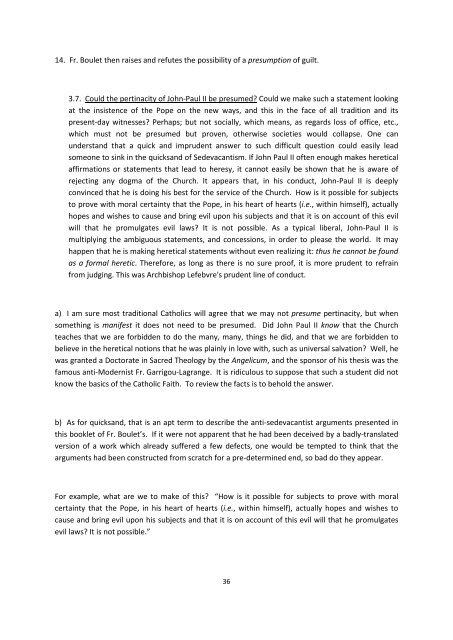Concerning an SSPX Dossier on Sedevacantism - Novus Ordo Watch
Concerning an SSPX Dossier on Sedevacantism - Novus Ordo Watch
Concerning an SSPX Dossier on Sedevacantism - Novus Ordo Watch
Create successful ePaper yourself
Turn your PDF publications into a flip-book with our unique Google optimized e-Paper software.
14. Fr. Boulet then raises <str<strong>on</strong>g>an</str<strong>on</strong>g>d refutes the possibility of a presumpti<strong>on</strong> of guilt.<br />
3.7. Could the pertinacity of John-Paul II be presumed? Could we make such a statement looking<br />
at the insistence of the Pope <strong>on</strong> the new ways, <str<strong>on</strong>g>an</str<strong>on</strong>g>d this in the face of all traditi<strong>on</strong> <str<strong>on</strong>g>an</str<strong>on</strong>g>d its<br />
present-day witnesses? Perhaps; but not socially, which me<str<strong>on</strong>g>an</str<strong>on</strong>g>s, as regards loss of office, etc.,<br />
which must not be presumed but proven, otherwise societies would collapse. One c<str<strong>on</strong>g>an</str<strong>on</strong>g><br />
underst<str<strong>on</strong>g>an</str<strong>on</strong>g>d that a quick <str<strong>on</strong>g>an</str<strong>on</strong>g>d imprudent <str<strong>on</strong>g>an</str<strong>on</strong>g>swer to such difficult questi<strong>on</strong> could easily lead<br />
some<strong>on</strong>e to sink in the quicks<str<strong>on</strong>g>an</str<strong>on</strong>g>d of Sedevac<str<strong>on</strong>g>an</str<strong>on</strong>g>tism. If John Paul II often enough makes heretical<br />
affirmati<strong>on</strong>s or statements that lead to heresy, it c<str<strong>on</strong>g>an</str<strong>on</strong>g>not easily be shown that he is aware of<br />
rejecting <str<strong>on</strong>g>an</str<strong>on</strong>g>y dogma of the Church. It appears that, in his c<strong>on</strong>duct, John-Paul II is deeply<br />
c<strong>on</strong>vinced that he is doing his best for the service of the Church. How is it possible for subjects<br />
to prove with moral certainty that the Pope, in his heart of hearts (i.e., within himself), actually<br />
hopes <str<strong>on</strong>g>an</str<strong>on</strong>g>d wishes to cause <str<strong>on</strong>g>an</str<strong>on</strong>g>d bring evil up<strong>on</strong> his subjects <str<strong>on</strong>g>an</str<strong>on</strong>g>d that it is <strong>on</strong> account of this evil<br />
will that he promulgates evil laws? It is not possible. As a typical liberal, John-Paul II is<br />
multiplying the ambiguous statements, <str<strong>on</strong>g>an</str<strong>on</strong>g>d c<strong>on</strong>cessi<strong>on</strong>s, in order to please the world. It may<br />
happen that he is making heretical statements without even realizing it: thus he c<str<strong>on</strong>g>an</str<strong>on</strong>g>not be found<br />
as a formal heretic. Therefore, as l<strong>on</strong>g as there is no sure proof, it is more prudent to refrain<br />
from judging. This was Archbishop Lefebvre's prudent line of c<strong>on</strong>duct.<br />
a) I am sure most traditi<strong>on</strong>al Catholics will agree that we may not presume pertinacity, but when<br />
something is m<str<strong>on</strong>g>an</str<strong>on</strong>g>ifest it does not need to be presumed. Did John Paul II know that the Church<br />
teaches that we are forbidden to do the m<str<strong>on</strong>g>an</str<strong>on</strong>g>y, m<str<strong>on</strong>g>an</str<strong>on</strong>g>y, things he did, <str<strong>on</strong>g>an</str<strong>on</strong>g>d that we are forbidden to<br />
believe in the heretical noti<strong>on</strong>s that he was plainly in love with, such as universal salvati<strong>on</strong>? Well, he<br />
was gr<str<strong>on</strong>g>an</str<strong>on</strong>g>ted a Doctorate in Sacred Theology by the Angelicum, <str<strong>on</strong>g>an</str<strong>on</strong>g>d the sp<strong>on</strong>sor of his thesis was the<br />
famous <str<strong>on</strong>g>an</str<strong>on</strong>g>ti-Modernist Fr. Garrigou-Lagr<str<strong>on</strong>g>an</str<strong>on</strong>g>ge. It is ridiculous to suppose that such a student did not<br />
know the basics of the Catholic Faith. To review the facts is to behold the <str<strong>on</strong>g>an</str<strong>on</strong>g>swer.<br />
b) As for quicks<str<strong>on</strong>g>an</str<strong>on</strong>g>d, that is <str<strong>on</strong>g>an</str<strong>on</strong>g> apt term to describe the <str<strong>on</strong>g>an</str<strong>on</strong>g>ti-sedevac<str<strong>on</strong>g>an</str<strong>on</strong>g>tist arguments presented in<br />
this booklet of Fr. Boulet’s. If it were not apparent that he had been deceived by a badly-tr<str<strong>on</strong>g>an</str<strong>on</strong>g>slated<br />
versi<strong>on</strong> of a work which already suffered a few defects, <strong>on</strong>e would be tempted to think that the<br />
arguments had been c<strong>on</strong>structed from scratch for a pre-determined end, so bad do they appear.<br />
For example, what are we to make of this? “How is it possible for subjects to prove with moral<br />
certainty that the Pope, in his heart of hearts (i.e., within himself), actually hopes <str<strong>on</strong>g>an</str<strong>on</strong>g>d wishes to<br />
cause <str<strong>on</strong>g>an</str<strong>on</strong>g>d bring evil up<strong>on</strong> his subjects <str<strong>on</strong>g>an</str<strong>on</strong>g>d that it is <strong>on</strong> account of this evil will that he promulgates<br />
evil laws? It is not possible.”<br />
36


